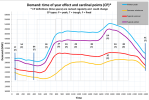National Grid are encouraging electricity distribution companies to introduce schemes to allow customers to be paid for saving electricity at peak times typically 1600-1900 for those customers with smart meters.
I get the impression that for Public Relations reasons they are looking at a reduction against past use rather than increasing the cost at the peak but does anyone know how any of the distribution companies are implementing this?
I get the impression that for Public Relations reasons they are looking at a reduction against past use rather than increasing the cost at the peak but does anyone know how any of the distribution companies are implementing this?



